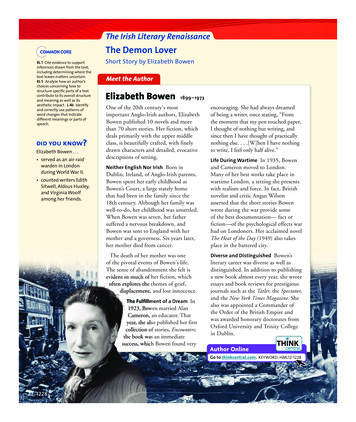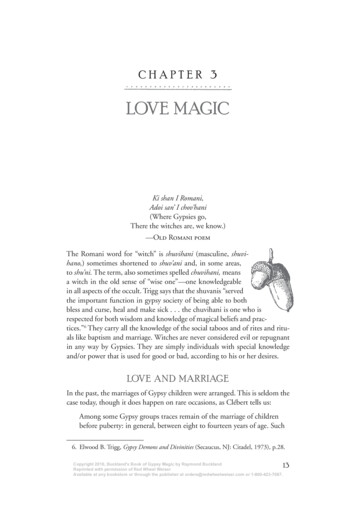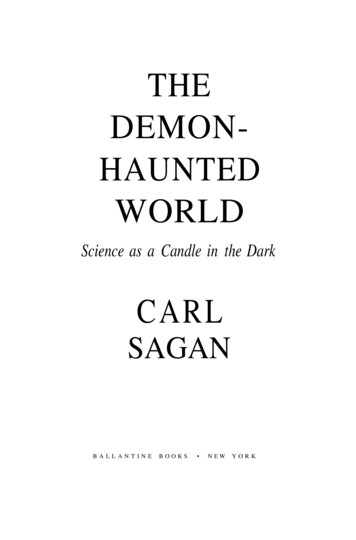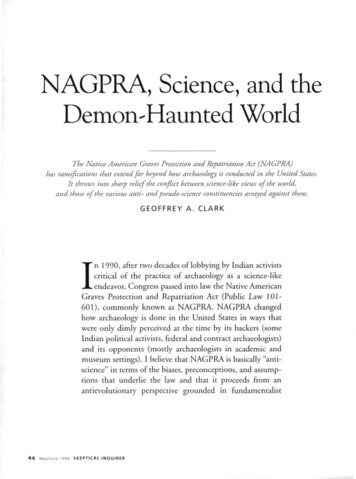
Transcription
The Irish Literary RenaissanceThe Demon LoverRL 1 Cite evidence to supportinferences drawn from the text,including determining where thetext leaves matters uncertain.RL 5 Analyze how an author’schoices concerning how tostructure specific parts of a textcontribute to its overall structureand meaning as well as itsaesthetic impact. L 4b Identifyand correctly use patterns ofword changes that indicatedifferent meanings or parts ofspeech.did you know?Elizabeth Bowen . . . served as an air-raidwarden in Londonduring World War II. counted writers EdithSitwell, Aldous Huxley,and Virginia Woolfamong her friends.Short Story by Elizabeth BowenMeet the AuthorElizabeth Bowen1899–1973One of the 20th century’s mostimportant Anglo-Irish authors, ElizabethBowen published 10 novels and morethan 70 short stories. Her fiction, whichdeals primarily with the upper middleclass, is beautifully crafted, with finelydrawn characters and detailed, evocativedescriptions of setting.Neither English Nor Irish Born inDublin, Ireland, of Anglo-Irish parents,Bowen spent her early childhood atBowen’s Court, a large stately homethat had been in the family since the18th century. Although her family waswell-to-do, her childhood was unsettled.When Bowen was seven, her fathersuffered a nervous breakdown, andBowen was sent to England with hermother and a governess. Six years later,her mother died from cancer.The death of her mother was oneof the pivotal events of Bowen’s life.The sense of abandonment she felt isevident in much of her fiction, whichoften explores the themes of grief,displacement, and lost innocence.The FulfillmFulfillment of a Dream In1923,1 23, Bowen19Bow married AlanCameron, an educator. Thatyear, she alsoal published her firstcollection ofo stories, Encounters;the book waswa an immediatesuccess, whichwhic Bowen found veryencouraging. She had always dreamedof being a writer, once stating, “Fromthe moment that my pen touched paper,I thought of nothing but writing, andsince then I have thought of practicallynothing else. . . .[W]hen I have nothingto write, I feel only half alive.”Life During Wartime In 1935, Bowenand Cameron moved to London.Many of her best works take place inwartime London, a setting she presentswith realism and force. In fact, Britishnovelist and critic Angus Wilsonasserted that the short stories Bowenwrote during the war provide someof the best documentation— fact orfiction—of the psychological effects warhad on Londoners. Her acclaimed novelThe Heat of the Day (1949) also takesplace in the battered city.Diverse and Distinguished Bowen’sliterary career was diverse as well asdistinguished. In addition to publishinga new book almost every year, she wroteessays and book reviews for prestigiousjournals such as the Tatler, the Spectator,and the New York Times Magazine. Shealso was appointed a Commander ofthe Order of the British Empire andwas awarded honorary doctorates fromOxford University and Trinity Collegein Dublin.Author OnlineGo to thinkcentral.com. KEYWORD: HML12-12281228NA L12PE-u06s24-brDLover.indd12281/5/1110:25:10 AM
text analysis: foreshadowing and flashbackAuthors of dark, spine-tingling tales like “The Demon Lover”often rely on the following narrative techniques to engagereaders: Foreshadowing—a writer’s use of hints and clues to indicateevents that will occur later in the story. Writers oftengenerate suspense, or excitement, through foreshadowing. Flashback—an episode that interrupts the action of thestory’s plot to show an experience that happened at anearlier time. Writers often provide important backgroundinformation about characters in flashbacks.As you read, notice how Bowen uses both foreshadowing andflashback to build your interest in the story.reading skill: analyze ambiguityIn fiction, ambiguity refers to the way in which a writerintentionally presents aspects of a story as confusing or opento interpretation. Writers often create ambiguity with words,phrases, and passages that have multiple meanings, as in thefollowing lines from “The Demon Lover”:A cat wove itself in and out of railings, but no human eyewatched Mrs. Drover’s return.The phrase “no human eye” could mean that nobody watchedMrs. Drover or something far more disturbing—that no humanwatched her. As you read the story, create a chart like the oneshown to record and interpret examples of ambiguity.Examples of AmbiguityPossible Interpretationsthe mysterious letter(lines 32–51)The caretaker, Mr. Drover, or anunknown character left the letter.How can apromisehaunt you?“The Demon Lover” is set in 1941 duringthe Blitz, the bombardment of Londonby the German air force. Against thisdramatic backdrop, the story’s maincharacter, Mrs. Drover, recalls herromantic past, including a dreadfulpromise made to a soldier going offto battle.DISCUSS With a partner, make alist of short stories, novels, and moviesthat feature a character makingan important promise. Discuss thepromise, the character, and thecharacter’s reasons for offeringthe promise. Explain whether thecharacter keeps or breaks thepromise by the end of the work.vocabulary in contextUse context clues to figure out the meanings of the boldfacedwords.1. Clearly he was no visionary, for his speech was prosaic.2. The white moths had a spectral appearance in the night sky.3. Never stingy, she gave without stint to many charities.4. Official duties can circumscribe the life of a princess.5. Brilliant ideas often emanate from creative discussions.Complete the activities in your Reader/Writer Notebook.1229NA L12PE-u06s24-brDLover.indd122912/2/1010:58:11 AM
The Demon LoverElizabeth Bowenbackground The onset of World War II placed a tremendous physical andpsychological burden on Londoners. From September 1940 to May 1941, the Germanair force launched a series of bombing raids designed to obliterate London and forceGreat Britain to surrender. Many families evacuated the city and moved to countryvillages and towns. Those who could not leave took refuge in subway tunnels andair-raid shelters during the long nights of horror.10Towards the end of her day in London Mrs. Drover went round to her shutup house to look for several things she wanted to take away. Some belonged toherself, some to her family, who were by now used to their country life. It waslate August; it had been a steamy, showery day: at the moment the trees down thepavement glittered in an escape of humid yellow afternoon sun. Against the nextbatch of clouds, already piling up ink-dark, broken chimneys and parapets 1 stoodout. In her once familiar street, as in any unused channel, an unfamiliar queernesshad silted up;2 a cat wove itself in and out of railings, but no human eye watchedMrs. Drover’s return. Shifting some parcels under her arm, she slowly forcedround her latchkey in an unwilling lock, then gave the door, which had warped,a push with her knee. Dead air came out to meet her as she went in. aThe staircase window having been boarded up, no light came down into thehall. But one door, she could just see, stood ajar, so she went quickly through intothe room and unshuttered the big window in there. Now the prosaic woman,looking about her, was more perplexed than she knew by everything that she saw,by traces of her long former habit of life—the yellow smoke stain up the whiteAnalyze VisualsWhy do you think thephotographer chose totint and blur this image?a FORESHADOWINGIn lines 1–11, what detailssuggest that Mrs. Drovermay be unsafe in herLondon home?prosaic (prI-zAPGk) adj.not given to poeticflights of fancy; lackingimagination; dull1. parapets (pBrPE-pGts): low walls or railings, such as those on balconies.2. silted up: piled up, like sediment deposited in a river.1230unit 6: modern and contemporary literatureNA L12PE-u06s24-DLover.indd123012/2/1010:55:38 AM
NA L12PE-u06s24-DLover.indd123112/2/1010:55:50 AM
203040marble mantelpiece, the ring left by a vase on the top of the escritoire;3 the bruisein the wallpaper where, on the door being thrown open widely, the china handlehad always hit the wall. The piano, having gone away to be stored, had left whatlooked like claw marks on its part of the parquet.4 Though not much dust hadseeped in, each object wore a film of another kind; and, the only ventilation beingthe chimney, the whole drawing room smelled of the cold hearth. Mrs. Droverput down her parcels on the escritoire and left the room to proceed upstairs; thethings she wanted were in a bedroom chest.She had been anxious to see how the house was—the part-time caretaker sheshared with some neighbors was away this week on his holiday, known to be notyet back. At the best of times he did not look in often, and she was never sure thatshe trusted him. There were some cracks in the structure, left by the last bombing,on which she was anxious to keep an eye. Not that one could do anything—A shaft of refracted daylight now lay across the hall. She stopped dead andstared at the hall table—on this lay a letter addressed to her.She thought first—then the caretaker must be back. All the same, who, seeingthe house shuttered, would have dropped a letter in at the box? It was not acircular, it was not a bill. And the post office redirected, to the address in thecountry, everything for her that came through the post. The caretaker (even if hewere back) did not know she was due in London today—her call here had beenplanned to be a surprise—so his negligence in the manner of this letter, leaving itto wait in the dusk and the dust, annoyed her. Annoyed, she picked up the letter,which bore no stamp. But it cannot be important, or they would know . . . Shetook the letter rapidly upstairs with her, without a stop to look at the writing tillshe reached what had been her bedroom, where she let in light. The room lookedover the garden and other gardens: the sun had gone in; as the clouds sharpenedand lowered, the trees and rank5 lawns seemed already to smoke with dark. Herreluctance to look again at the letter came from the fact that she felt intrudedupon—and by someone contemptuous of her ways. However, in the tensenesspreceding the fall of rain she read it: it was a few lines.Dear Kathleen: You will not have forgotten that today is our anniversary, and theday we said. The years have gone by at once slowly and fast. In view of the factthat nothing has changed, I shall rely upon you to keep your promise. I was sorry tosee you leave London, but was satisfied that you would be back in time. You mayexpect me, therefore, at the hour arranged. Until then . . .K. b50Mrs. Drover looked for the date: it was today’s. She dropped the letter onto thebedsprings, then picked it up to see the writing again—her lips, beneath theremains of lipstick, beginning to go white. She felt so much the change in herown face that she went to the mirror, polished a clear patch in it and looked atonce urgently and stealthily in. She was confronted by a woman of forty-four,b AMBIGUITYReread lines 47–51.Who is “K,” the authorof the mysterious letter?Offer two possibleidentifications for thisambiguous character.3. escritoire (DsQkrG-twärP): a writing desk or table.4. parquet (pär-kAP): a wood floor made of small blocks laid in geometric patterns.5. rank: growing vigorously and coarsely.1232unit 6: modern and contemporary literatureNA L12PE-u06s24-DLover.indd123212/2/1010:55:56 AM
60708090with eyes starting out under a hat brim that had been rather carelessly pulleddown. She had not put on any more powder since she left the shop where she ateher solitary tea. The pearls her husband had given her on their marriage hungloose round her now rather thinner throat, slipping in the V of the pink wooljumper6 her sister knitted last autumn as they sat round the fire. Mrs. Drover’smost normal expression was one of controlled worry, but of assent. Since the birthof the third of her little boys, attended by a quite serious illness, she had had anintermittent muscular flicker to the left of her mouth, but in spite of this shecould always sustain a manner that was at once energetic and calm.Turning from her own face as precipitately as she had gone to meet it, she wentto the chest where the things were, unlocked it, threw up the lid and knelt tosearch. But as rain began to come crashing down she could not keep from lookingover her shoulder at the stripped bed on which the letter lay. Behind the blanketof rain the clock of the church that still stood struck six—with rapidly heighteningapprehension she counted each of the slow strokes. “The hour arranged . . . MyGod,” she said, “what hour? How should I . . . ? After twenty-five years . . .”The young girl talking to the soldier in the garden had not ever completelyseen his face. It was dark; they were saying goodbye under a tree. Now andthen—for it felt, from not seeing him at this intense moment, as though she hadnever seen him at all—she verified his presence for these few moments longer byputting out a hand, which he each time pressed, without very much kindness, andpainfully, onto one of the breast buttons of his uniform. That cut of the buttonon the palm of her hand was, principally, what she was to carry away. This wasso near the end of a leave from France that she could only wish him already gone.It was August 1916.7 Being not kissed, being drawn away from and looked at,intimidated Kathleen till she imagined spectral glitters in the place of his eyes.Turning away and looking back up the lawn she saw, through branches of trees,the drawing-room window alight: she caught a breath for the moment when shecould go running back there into the safe arms of her mother and sister, and cry:“What shall I do, what shall I do? He has gone.”Hearing her catch her breath, her fiancé said, without feeling: “Cold?”“You’re going away such a long way.”“Not so far as you think.”“I don’t understand?”“You don’t have to,” he said. “You will. You know what we said.”“But that was—suppose you—I mean, suppose.”“I shall be with you,” he said, “sooner or later. You won’t forget that. You needdo nothing but wait.”Only a little more than a minute later she was free to run up the silent lawn.Looking in through the window at her mother and sister, who did not for themoment perceive her, she already felt that unnatural promise drive down betweenher and the rest of all humankind. No other way of having given herself couldL 4bLanguage CoachDerivations Manydifferent words arederived, or generated,from the same baseword. A precipice, whichcomes from a Latin wordmeaning “headlongfall,” is a steep cliff.How is precipitately(line 66), meaning“suddenly,”related toprecipice? What otherword derivations arerelated to precipice?spectral (spDkPtrEl) adj.ghostly6. jumper: pullover sweater.7. leave . . . 1916: The young man was on leave from the fighting in France during World War I.the demon loverNA L12PE-u06s24-DLover.indd1233123312/2/1010:55:57 AM
100110120130have made her feel so apart, lost and foresworn.8 She could not have plighted amore sinister troth.9 cKathleen behaved well when, some months later, her fiancé was reportedmissing, presumed killed. Her family not only supported her but were able topraise her courage without stint because they could not regret, as a husband forher, the man they knew almost nothing about. They hoped she would, in a yearor two, console herself—and had it been only a question of consolation thingsmight have gone much straighter ahead. But her trouble, behind just a little grief,was a complete dislocation from everything. She did not reject other lovers, forthese failed to appear: for years she failed to attract men—and with the approachof her thirties she became natural enough to share her family’s anxiousness onthis score. She began to put herself out, to wonder; and at thirty-two she was verygreatly relieved to find herself being courted by William Drover. She marriedhim, and the two of them settled down in this quiet, arboreal part of Kensington:10in this house the years piled up, her children were born and they all lived till theywere driven out by the bombs of the next war. Her movements as Mrs. Droverwere circumscribed, and she dismissed any idea that they were still watched.As things were—dead or living the letter-writer sent her only a threat. Unable,for some minutes, to go on kneeling with her back exposed to the empty room,Mrs. Drover rose from the chest to sit on an upright chair whose back was firmlyagainst the wall. The desuetude 11 of her former bedroom, her married Londonhome’s whole air of being a cracked cup from which memory, with its reassuringpower, had either evaporated or leaked away, made a crisis—and at just this crisisthe letter-writer had, knowledgeably, struck. The hollowness of the house thisevening canceled years on years of voices, habits and steps. Through the shutwindows she only heard rain fall on the roofs around. To rally herself, she said shewas in a mood—and for two or three seconds shutting her eyes, told herself thatshe had imagined the letter. But she opened them—there it lay on the bed.On the supernatural side of the letter’s entrance she was not permitting hermind to dwell. Who, in London, knew she meant to call at the house today?Evidently, however, this had been known. The caretaker, had he come back,had had no cause to expect her: he would have taken the letter in his pocket, toforward it, at his own time, through the post. There was no other sign that thecaretaker had been in—but, if not? Letters dropped in at doors of deserted housesdo not fly or walk to tables in halls. They do not sit on the dust of empty tableswith the air of certainty that they will be found. There is needed some humanhand—but nobody but the caretaker had a key. Under circumstances she did notcare to consider, a house can be entered without a key. It was possible that shewas not alone now. She might be being waited for, downstairs. Waited for—untilwhen? Until “the hour arranged.” At least that was not six o’clock: six has struck.She rose from the chair and went over and locked the door.cFLASHBACKReread the flashbackin lines 73–100. Whatimportant informationdo you learn about Mrs.Drover and the writerof the letter in thisepisode?stint (stGnt) n. ) v. torestrict; to limit8. foresworn: guilty of perjury.9. plighted . . . troth: made a more ominous promise of marriage.10. arboreal (är-bôrPC-El) . . . Kensington: woodsy part of Kensington, a residential London neighborhood.11. desuetude (dDsPwG-tLdQ): disuse.1234unit 6: modern and contemporary literatureNA L12PE-u06s24-DLover.indd123412/2/1010:55:58 AM
140150160170180The thing was, to get out. To fly? No, not that: she had to catch her train. Asa woman whose utter dependability was the keystone of her family life she wasnot willing to return to the country, to her husband, her little boys and her sister,without the objects she had come up to fetch. Resuming work at the chest she setabout making up a number of parcels in a rapid, fumbling-decisive way. These,with her shopping parcels, would be too much to carry; these meant a taxi—atthe thought of the taxi her heart went up and her normal breathing resumed. Iwill ring up the taxi now; the taxi cannot come too soon: I shall hear the taxi outthere running its engine, till I walk calmly down to it through the hall. I’ll ringup—But no: the telephone is cut off . . . She tugged at a knot she had tied wrong.The idea of flight . . . He was never kind to me, not really. I don’t rememberhim kind at all. Mother said he never considered me. He was set on me, that waswhat it was—not love. Not love, not meaning a person well. What did he do, tomake me promise like that? I can’t remember—But she found that she could.She remembered with such dreadful acuteness that the twenty-five years sincethen dissolved like smoke and she instinctively looked for the weal12 left by thebutton on the palm of her hand. She remembered not only all that he said and didbut the complete suspension of her existence during that August week. I was notmyself—they all told me so at the time. She remembered—but with one whiteburning blank as where acid has dropped on a photograph: under no conditionscould she remember his face.So, wherever he may be waiting, I shall not know him. You have no time to runfrom a face you do not expect.The thing was to get to the taxi before any clock struck what could be thehour. She would slip down the street and round the side of the square to wherethe square gave on the main road. She would return in the taxi, safe, to her owndoor, and bring the solid driver into the house with her to pick up the parcelsfrom room to room. The idea of the taxi driver made her decisive, bold: sheunlocked her door, went to the top of the staircase and listened down.She heard nothing—but while she was hearing nothing the passé 13 air of thestaircase was disturbed by a draft that traveled up to her face. It emanated fromthe basement: down there a door or window was being opened by someone whochose this moment to leave the house.The rain had stopped; the pavements steamily shone as Mrs. Drover let herselfout by inches from her own front door into the empty street. The unoccupiedhouses opposite continued to meet her look with their damaged stare. Makingtowards the thoroughfare and the taxi, she tried not to keep looking behind.Indeed, the silence was so intense—one of those creeks of London silenceexaggerated this summer by the damage of war—that no tread could have gainedon hers unheard. Where her street debouched14 on the square where peoplewent on living, she grew conscious of, and checked, her unnatural pace. AcrossLanguage CoachMeanings of IdiomsIdioms are expressionsthat have a specialmeaning different fromthe dictionary meaningof the words. In somecontexts, the expressionthe thing can mean “thatwhich is important oressential.” Paraphrase“The thing was, to getout” (line 140).emanate (DmPE-nAtQ) v.to issue forth12. weal: a mark or ridge raised on the skin; a welt.13. passé (pB-sAP) French: old; stale.14. debouched (dG-bôchtP): emerged.the demon loverNA L12PE-u06s24-DLover.indd1235123512/2/1010:55:58 AM
190the open end of the square two buses impassively passed each other: women,a perambulator,15 cyclists, a man wheeling a barrow signalized, once again, theordinary flow of life. At the square’s most populous corner should be—and was—the short taxi rank. This evening, only one taxi—but this, although it presentedits blank rump, appeared already to be alertly waiting for her. Indeed, withoutlooking round the driver started his engine as she panted up from behind andput her hand on the door. As she did so, the clock struck seven. The taxi facedthe main road: to make the trip back to her house it would have to turn—shehad settled back on the seat and the taxi had turned before she, surprised by itsknowing movement, recollected that she had not “said where.” She leaned forwardto scratch at the glass panel that divided the driver’s head from her own.The driver braked to what was almost a stop, turned round and slid the glasspanel back: the jolt of this flung Mrs. Drover forward till her face was almost intothe glass. Through the aperture 16 driver and passenger, not six inches betweenthem, remained for an eternity eye to eye. Mrs. Drover’s mouth hung open forsome seconds before she could issue her first scream. After that she continued toscream freely and to beat with her gloved hands on the glass all round as the taxi,accelerating without mercy, made off with her into the hinterland17 of desertedstreets. dd AMBIGUITYIdentify two possibleinterpretations of thestory’s conclusion.What effect does thisambiguous ending haveon you as a reader?15. perambulator: baby carriage.16. aperture (BpPEr-chEr): opening.17. hinterland: backcountry; wilderness.1236unit 6: modern and contemporary literatureNA L12PE-u06s24-DLover.indd123612/2/1010:55:59 AM
After ReadingComprehension1. Recall Why has the Drover family left their home in London?2. Recall Why does Mrs. Drover return to the house?3. Summarize Describe what happens after Mrs. Drover leaves the house.Text Analysis4. Understand Setting and Mood Review the description of the story’s settingin lines 1–24. What mood, or atmosphere, does this passage establish? Citespecific words and phrases to support your answer.RL 1 Cite evidence to supportinferences drawn from the text,including determining where thetext leaves matters uncertain.RL 5 Analyze how an author’schoices concerning how tostructure specific parts of a textcontribute to its overall structureand meaning as well as itsaesthetic impact.5. Examine Foreshadowing Reread the following passages from “The Demon Lover.”In what specific ways do they hint at important events presented later in the story? “Her reluctance . . . of her ways.” (lines 43–45) “Only a little more . . . a more sinister troth.” (lines 95–100) “She heard nothing . . . leave the house.” (lines 169–172)6. Draw Conclusions About Character Describe the thoughts and behavior ofMrs. Drover in each of the following scenes. Do you think that she is a victim ofher own troubled mind, some supernatural force, or a combination of these? her reaction to the mysterious letter (lines 52–65) her farewell meeting with her former fiancé (lines 73–100) her memories as she packs (lines 150–160)7. Analyze Ambiguity Review the chart in which you recorded differentexamples of ambiguity. Identify the ambiguous word, phrase, or passage thatyou found most intriguing or effective. In your opinion, what doesthis example contribute to the story?8. Evaluate Flashback Reread the flashback in lines 73–100. Would the storybe as powerful if the events had been told in chronological order withoutthe use of flashback? Explain your thoughts.Text Criticism9. Cultural Context The title of Bowen’s story derives from a figure in gothicliterature, the demon lover—a man who abducts his sweetheart because shehas broken her promise of faithfulness. The sweetheart happily follows herlover, only to discover too late that he is leading her toward death. In whatways does this information enhance your understanding of the story?How can apromise haunt you?Do you think the protagonist of Bowen’s story got what she deserved forbreaking her promise? Why or why not?the demon loverNA L12PE-u06s24-arDLover.indd123712371/13/1112:41:48 PM
Vocabulary in Contextvocabulary practiceword listIdentify the antonym of each boldfaced vocabulary word.circumscribe1. prosaic: (a) prosperous, (b) everyday, (c) imaginative2. spectral: (a) gloomy, (b) whimsical, (c) substantial3. stint: (a) weakness, (b) generosity, (c) beginningemanateprosaicspectralstint4. circumscribe: (a) control, (b) decide, (c) release5. emanate: (a) influence, (b) absorb, (c) exudeacademic vocabulary in speaking approach assume environment method strategyHow do you approach the existence of the supernatural? Do you assume thatghosts and other supernatural figures may be real or do you think they aremerely projections of the human mind? Discuss this question in a small group.Use at least two of the Academic Vocabulary words in your discussion.vocabulary strategy: the latin prefix circum-L 6 Acquire and use accuratelygeneral academic and domainspecific words and phrases.The word circumscribe joins the prefix circum-, which means “around,” to theroot scribe, which comes from the Latin word for “tocircumnavigatewrite.” Circumscribe means “to write marks or a circlearound someone or something,” setting limits withinwhich that person or thing can operate. Circumscribecircumpolarcircumcircumstantialalso has a technical academic meaning: in geometry,it describes, for example, a circle surrounding andintersecting the corners of a square. Each word in thecircumferencecircumlocutionweb diagram at right has a technical, academic usage.Some are also used in everyday speech.PRACTICE Use context clues and your knowledge of word parts to explain themeaning of each boldfaced word. Then, where possible, use the boldfaced wordin an everyday sense. Note whether the common, everyday sense of the word isdifferent from its technical meaning.1. Circumstantial evidence—namely, motive and opportunity— pointed to thedefendant’s guilt; but no physical evidence linked her to the crime.2. One form of euphemism, the substitution of mild or vague language forharsh, realistic terminology, is circumlocution.3. The formula for the circumference of a circle is 2πr.InteractiveVocabulary4. Was Magellan the first explorer to circumnavigate the globe?Go to thinkcentral.com.5. Circumpolar objects, such as stars, never sink below the horizon.KEYWORD: HML12-12381238unit 6: modern and contemporary literatureNA L12PE-u06s24-arDLover.indd12381/13/1112:41:50 PM
Wrap-Up: The Irish Literary RenaissanceThe Flowering of Irish LettersFor hundreds of years, Irish literature written in English did not haveits own identity. However, in the 20th century, as Ireland undertookits quest for national independence and rebounded from thedevastation of the potato famine, the Irish began to take stock oftheir own cultural heritage.Led by William Butler Yeats, writers of the Irish literary revivalvigorously explored Irish identity. Some wrote explicitly about suchtopics as Irish rural life, the effects of colonialism, and Irish folklore.Others wrote about classical topics or accounts of modern life, butalways with an ear for the lyricism of Irish speech and a sensitivitytoward common themes such as spirituality and repression, oftentinged with fatalism. Also, modern Irish writers shared the clever andsometimes dark wit typical of their countrymen.Extension OnlineINQUIRY & RESEARCH Usethe Internet to research thepolitical and cultural conditionssurrounding the Irish LiteraryRenaissance. What values werebeing expressed? How did themovement spread? How was thisliterature received by the public?Write a brief report to explainyour findings.Writing to CompareThe Irish writers in this
"The Demon Lover" is set in 1941 during the Blitz, the bombardment of London by the German air force. Against this dramatic backdrop, the story's main character, Mrs. Drover, recalls her romantic past, including a dreadful promise made to a soldier going off to battle. DISCUSS With a partner, make a list of short stories, novels, and movies










